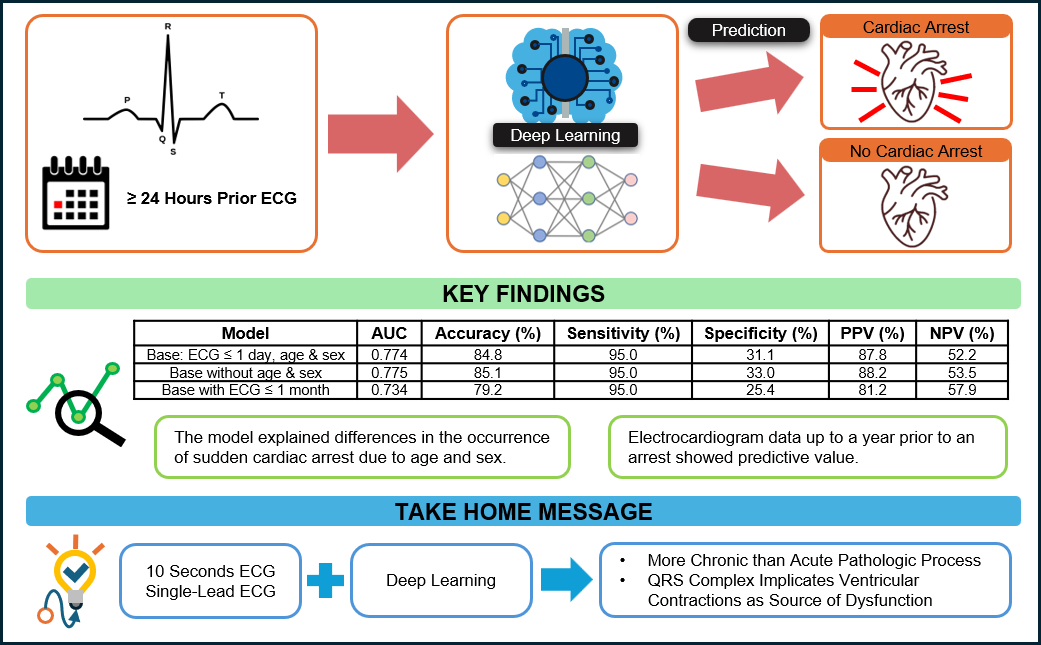Final ID: Su803
Sudden Cardiac Arrest Prediction via Deep Learning Electrocardiogram Analysis
Abstract Body: Background: Sudden cardiac arrest (SCA) is a potentially fatal event that often occurs without prior indications.
Hypothesis: It was hypothesized that electrocardiogram (ECG) data could be used in conjunction with Deep Learning (DL) algorithms to predict the occurrence of SCA’s.
Aims: To improve SCA outcomes and enable preventative strategies, the ECG data from the Nightingale Open Science - Subtyping Cardiac Arrest dataset were utilized to create a DL model to serve as a screening tool for sudden cardiac arrest.
Methods: A publicly-available dataset containing ten seconds of 12-lead ECGs from individuals who had a SCA and persons who did not have a SCA, and information about time from ECG to arrest, and age and sex were utilized for individualized prediction of SCA. Subsets of the initial data were used to train, validate, and test deep convolution neural network models that processed cardiac cycles from single-lead ECG voltage waveforms.
Results The cohort comprised 221 (mean age: 68.5 and #females: 75) patients who experienced SCA and 1046 controls (mean age: 69.7 and #females: 497) who did not have a cardiac arrest. The SCA ECG-DL base model, with ECGs within one day and with age and sex data, had an area under the receiver operating curve (AUROC) of 0.774 during hold-out testing for discrimination of subsequent SCA. With sensitivity set at 95%, the base model specificity of the SCA ECG-DL model was 31%. Gradient-weighted class activation mapping showed that the SCA ECG-DL model relied most heavily on the QRS complex to make predictions. The performance of the SCA ECG-DL model was similar removing age and sex data (AUROC 0.775) and less reliable when predicting SCA within one month (AUROC 0.734) or between one month and one year (AUROC 0.574).
Conclusion: DL interpretation of ECG data is a promising means of screening for SCA, and this method explains differences in SCA’s due to age and sex. Model performance improved when ECGs were obtained at shorter intervals to the incident SCA event, and SCA prediction was more dependent upon QRS complex data than other temporal segments of the ECG.
Hypothesis: It was hypothesized that electrocardiogram (ECG) data could be used in conjunction with Deep Learning (DL) algorithms to predict the occurrence of SCA’s.
Aims: To improve SCA outcomes and enable preventative strategies, the ECG data from the Nightingale Open Science - Subtyping Cardiac Arrest dataset were utilized to create a DL model to serve as a screening tool for sudden cardiac arrest.
Methods: A publicly-available dataset containing ten seconds of 12-lead ECGs from individuals who had a SCA and persons who did not have a SCA, and information about time from ECG to arrest, and age and sex were utilized for individualized prediction of SCA. Subsets of the initial data were used to train, validate, and test deep convolution neural network models that processed cardiac cycles from single-lead ECG voltage waveforms.
Results The cohort comprised 221 (mean age: 68.5 and #females: 75) patients who experienced SCA and 1046 controls (mean age: 69.7 and #females: 497) who did not have a cardiac arrest. The SCA ECG-DL base model, with ECGs within one day and with age and sex data, had an area under the receiver operating curve (AUROC) of 0.774 during hold-out testing for discrimination of subsequent SCA. With sensitivity set at 95%, the base model specificity of the SCA ECG-DL model was 31%. Gradient-weighted class activation mapping showed that the SCA ECG-DL model relied most heavily on the QRS complex to make predictions. The performance of the SCA ECG-DL model was similar removing age and sex data (AUROC 0.775) and less reliable when predicting SCA within one month (AUROC 0.734) or between one month and one year (AUROC 0.574).
Conclusion: DL interpretation of ECG data is a promising means of screening for SCA, and this method explains differences in SCA’s due to age and sex. Model performance improved when ECGs were obtained at shorter intervals to the incident SCA event, and SCA prediction was more dependent upon QRS complex data than other temporal segments of the ECG.
More abstracts on this topic:
A Porcine Model of Cardiac Arrest Without Pre-Arrest Fluid Loading, Sternal Molding, or Epinephrine
Paradis Aidan, Paradis Norman, Gaddy David, Moodie Karen, Mader Timothy, Dufresne Alexandre, Couturier Christine, Dufresne Simon, Davis Daniel, Sims Christopher
A Comparison of Synchronized Versus Unsynchronized Mechanical Chest Compressions in a Swine ModelMarill Keith, Menegazzi James, Gumucio Jorge, Salcido David

